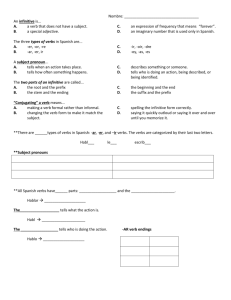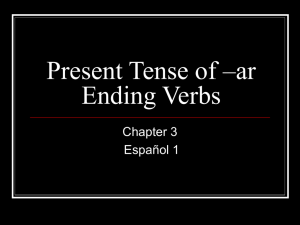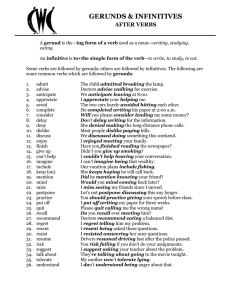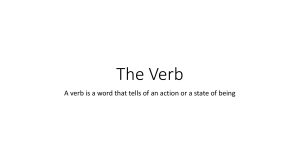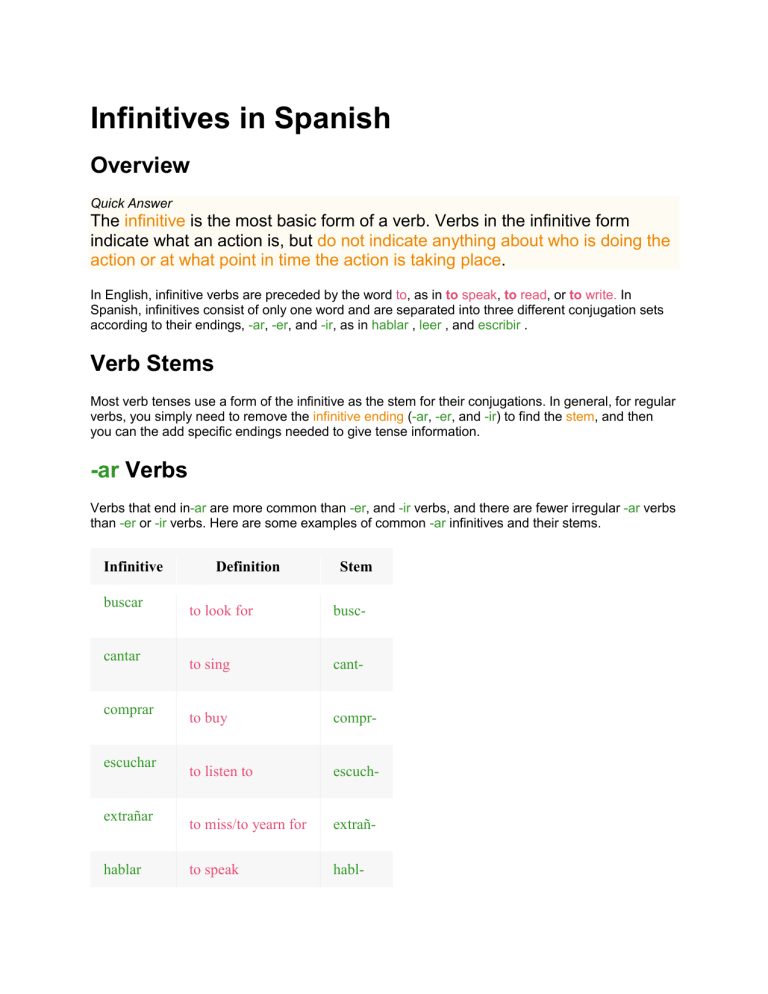
Infinitives in Spanish Overview Quick Answer The infinitive is the most basic form of a verb. Verbs in the infinitive form indicate what an action is, but do not indicate anything about who is doing the action or at what point in time the action is taking place. In English, infinitive verbs are preceded by the word to, as in to speak, to read, or to write. In Spanish, infinitives consist of only one word and are separated into three different conjugation sets according to their endings, -ar, -er, and -ir, as in hablar , leer , and escribir . Verb Stems Most verb tenses use a form of the infinitive as the stem for their conjugations. In general, for regular verbs, you simply need to remove the infinitive ending (-ar, -er, and -ir) to find the stem, and then you can the add specific endings needed to give tense information. -ar Verbs Verbs that end in-ar are more common than -er, and -ir verbs, and there are fewer irregular -ar verbs than -er or -ir verbs. Here are some examples of common -ar infinitives and their stems. Infinitive buscar cantar comprar escuchar extrañar hablar Definition Stem to look for busc- to sing cant- to buy compr- to listen to escuch- to miss/to yearn for extrañ- to speak habl- llamar llenar llevar mirar visitar to call llam- to fill llen- to carry llev- to watch mir- to visit visit- -er Verbs Verbs that end in -er are the second-largest group of infinitives in Spanish. Here are some examples of common -er infinitives and their stems. Infinitive beber comer comprender correr creer deber leer Definition Stem to drink beb- to eat com- to understand comprend- to run corr- to believe cre- to owe deb- to read le- meter romper vender to put into met- to break romp- to sell vend- -ir Verbs Verbs that end in -ir are the smallest group of Spanish infinitives. Here are some examples of common -ir infinitives and their stems. Infinitive abrir asistir cubrir escribir incluir pedir permitir recibir servir Definition Stem to open abr- to attend asist- to cover cubr- to write escrib- to include inclu- to order ped- to allow permit- to receive recib- to serve serv- vivir to live viv- Infinitives as Nouns In Spanish, when a verb functions as a noun, the infinitive is used, and it is always singular and masculine. It can be used as the subject of a sentence or the object of another verb or preposition. When the infinitive is used as a noun, you don't usually use an article (such as el or un) with it, though it's acceptable to use the article el in front of an infinitive that is the subject of a sentence. Bailar tango es difícil. Dancing the tango is hard. Está prohibido sacar fotos aquí. Taking pictures is prohibited here. Pienso salir con él. I am thinking about going out with him. Lo hice sin pensar. I did it without thinking. El nadar es buen ejercicio. Swimming is good exercise. English Translations of Spanish Infinitives Spanish infinitives can often be translated into English as infinitives (like to do) or gerunds (like doing). Me gusta nadar. I like to swim./I like swimming. Hablar español es divertido. Speaking Spanish is fun./It is fun to speak Spanish. Infinitive Commands To form an infinitive command, simply use the word no followed by an infinitive. You don't need to conjugate anything! No fumar. No smoking. Batir los huevos. Beat the eggs. Verbs Used with Infinitives Here are some verbs and verb phrases commonly used before another verb in the infinitive. aceptar acordar afirmar amenazar anhelar asegurar to accept to agree to say/state to threaten to long for to assure buscar creer deber decidir demostrar desear enseñar a esperar fingir gustar intentar ir a lamentar lograr negar to look for to believe to have to, should to decide to show to desire/want to teach to hope for to pretend to like to try to go to regret to succeed in to deny pensar en poder preferir prometer querer reconocer recordar seguir sentir soler temer tener que tratar de to think about/of to be able to to prefer to promise to want to acknowledge to remember to follow/to continue to feel to be used to to fear to have to try Vamos a bailar. We are going to dance. Tienes que sacar la basura. You have to take out the trash. Quiero salir para la fiesta. I want to leave for the party. Me gusta dibujar. I like to draw.
